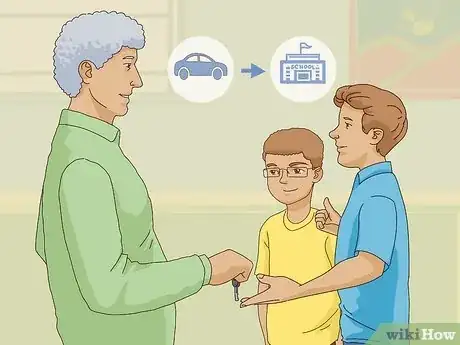This article was co-authored by Kim Chronister, PsyD. Dr. Kim Chronister is a Licensed Clinical Psychologist. She specializes in helping people struggling with substance abuse, relationship problems, eating disorders, and personality disorders. Dr. Chronister has contributed to and appeared on Access Hollywood, Investigation Discovery, and NBC News. She is the author of “Peak Mindset” and “FitMentality.” She holds an MA in Clinical Psychology and a Doctor of Psychology (PsyD) from Alliant International University.
This article has been viewed 123,240 times.
You may desire more freedom much sooner than your parents are ready to give it to you. It could be that you want a later curfew or more time to go out with friends, but your parents are concerned about your safety. You will need to show your parents that you are trustworthy and responsible in order to have more freedom.
Steps
Earning Their Trust
-
1Obey your parents' rules. Always come home when you're supposed to, and take care of your chores without being asked. Your parents are much more likely to give you freedom if they can trust you to respect their rules.[1]
- Try your best to listen to your parents and follow their instructions without complaint. Acting rebellious will not help you prove your trustworthiness.
- Stick to your word. If you tell them that you are going to do something, such as cleaning your room or mowing the lawn, make sure you do it. This will show them that you are honest and responsible.
-
2Try your best in school. Finish your homework on time so that you keep your grades up. Doing well in school shows your parents that you can handle responsibility, and they will likely notice how hard you are working. You can always talk to your teachers if you are having trouble with this.
- Talk to your parents about your school work so that they see you are motivated and responsible at school, as well as at home. [2]
Advertisement -
3Avoid dangerous behavior and reckless people. It will be much harder for your parents to trust you if you're drinking, partying a lot, or hanging out with the wrong crowd. If they don't trust you currently, they are much less likely to give you more freedom.[3]
- If your parents are unsure about your friends, bring your friends home so your parents can see how kind and responsible they are.
- Always ask before hanging out with friends or staying out late. Your parents will appreciate knowing where you are and what you are doing.
-
4Connect with your parents. Let them know what's going on in your life, and tell them about your interests. They'll be more inclined to consider your requests if they understand your perspective.[4]
- Start conversations along the lines of "So this happened at school today..." or "There's a party coming up this weekend." They might be less surprised when you ask for more freedom if they know what's happening in your life.
- Ask them for advice regarding school, friends, or anything else you have going on. They'll appreciate that you value their opinions.
- Let your parents know that you relationship is important to you, and that you want the kind of relationship where you can come to them.
Having a Conversation with Them
-
1Choose an appropriate time to discuss this topic. Make sure that no one is angry or emotional beforehand and that you have plenty of time to talk about any issues. Don't bring this up in front of younger siblings.[5]
- You might make notes for yourself, so you don't forget to touch on every point.
-
2Ask them in a calm and mature manner. Explain to them exactly why you think you can handle this particular freedom, and don't raise your voice. Be assertive and speak in a warm tone. Becoming angry or upset will only prove to them that you are not yet mature enough to handle additional freedom.[6]
- Identify which specific freedoms you want. This might be a later curfew, more computer time, or permission to go to a concert.
- Be prepared that this might be an ongoing conversation. They may need to think about it before making a decision.
-
3Consider their point of view. Talk through any concerns that they might have. For instance, if you're asking to go out with a friend, see if you can get them in contact with that friend's parents. Remember to remain calm, even if they say things you disagree with.[7]
- Think about any possible risks or consequences, and be ready to answer any questions your parents might have.
-
4Give recent examples that prove that you are dependable. Perhaps you get decent grades consistently, do your chores without complaints, and interact well with your siblings. Remind them of how responsible and hardworking you've been acting recently.[8]
- If you've done anything particularly special, such as cooking dinner for your parents or taking on more chores, be sure to include that as well.
Making Compromises
-
1Offer to make a deal. For instance, tell them that you'll maintain a certain GPA if you're given an hour later curfew. Your parents may be comfortable giving you more freedom if they know you'll be working hard to keep it.[9]
- If you are old enough to drive, offer to drive younger siblings (if you have them) to school or other activities in exchange for more opportunities to borrow the car.
- If the problem is that your parents are concerned about your safety, see if they will allow you to take self-defense classes.
-
2Help out around the house. Take initiative by doing chores that are not typically your responsibility. It really surprises parents when they come home to a clean house and they didn't ask you to do anything.
- Perhaps they will let you have friends over or throw a party if you prepare the house beforehand and promise to clean up afterwards.
- If you don't have any ideas, ask them what you can do to gain the freedom you'd like. [10]
-
3Remain calm and accept their decision. If they say no, respect that choice, but still continue your good behavior. Eventually they might see how hard you're working and reward your efforts. Prove that you are mature by accepting your current conditions.
- Now that they know how you feel, they may take notice and give you more freedom on their own.[11]
References
- ↑ http://www.momtastic.com/parenting/105643-5-tips-for-giving-your-teenager-more-freedom/
- ↑ http://health.usnews.com/wellness/for-parents/articles/2017-07-03/what-to-do-if-your-teen-demands-more-freedom-than-youre-ready-to-give
- ↑ http://www.momtastic.com/parenting/105643-5-tips-for-giving-your-teenager-more-freedom/
- ↑ http://health.usnews.com/wellness/for-parents/articles/2017-07-03/what-to-do-if-your-teen-demands-more-freedom-than-youre-ready-to-give
- ↑ https://wehavekids.com/family-relationships/How-to-Get-Your-Freedom-from-Overprotective-Parents
- ↑ https://www.psychologytoday.com/blog/surviving-your-childs-adolescence/201402/adolescence-and-gaining-parental-permission
- ↑ https://www.psychologytoday.com/blog/surviving-your-childs-adolescence/201402/adolescence-and-gaining-parental-permission
- ↑ https://www.psychologytoday.com/blog/surviving-your-childs-adolescence/201402/adolescence-and-gaining-parental-permission
- ↑ https://wehavekids.com/family-relationships/How-to-Get-Your-Freedom-from-Overprotective-Parents






































































